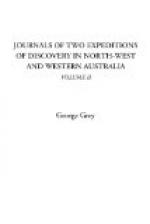The chief cause of the misapprehension which has so long existed with regard to the point under consideration is that the language of the aborigines of Australia abounds in synonymes, many of which are, for a time, altogether local; so that, for instance, the inhabitants of a particular district will use one word for water, whilst those of a neighbouring district will apply another, which appears to be a totally different one. But when I found out that in such instances as these both tribes understood the words which either made use of, and merely employed another one, from temporary fashion and caprice, I felt convinced that the language generally spoken to Europeans by the natives of any one small district could not be considered as a fair specimen of the general language of that part of Australia, and therefore in the vocabulary which I compiled in Western Australia I introduced words collected from a very extensive tract of country.
Again, in getting the names of the parts of the body, etc., from the natives, many causes of error arise; for they have names for almost every minute portion of the human frame: thus, in asking the name for the arm, one stranger would get the name for the upper arm, another for the lower arm, another for the right arm, another for the left arm, etc.; and it therefore seems most probable that in the earlier stages of the inquiry into the nature of the language of this people these circumstances contributed mainly to the erroneous conclusion that languages radically different were spoken in remote parts of the continent.
PROOFS OF IDENTITY OF THE LANGUAGE THROUGHOUT THE CONTINENT.
One singularity in the dialects spoken by the aborigines in different portions of Australia is that those of districts widely removed from one another sometimes assimilate very closely, whilst the dialects spoken in the intermediate ones differ considerably from either of them. The same circumstances take place with regard to their rites and customs; but as this appears rather to belong to the question of the means by which this race was distributed over so extensive a tract of country, I will not now enter into it, but merely adduce sufficient evidence to prove that a language radically the same is spoken over the whole continent.
If then we start from Perth in Western Australia, following the coast in a southerly direction, it will be found that between Perth and King George’s Sound a common language is spoken, made up of several dialects, scarcely differing from one another in any material points and gradually merging into the dialects of these two places, as the points considered are nearer to one or the other.
The principal causes of difference between the dialects of these two places are, 1st, that at King George’s Sound the terminating syllable of all names is dropped; and 2nd, that all verbs, with a very few exceptions, end in gur, instead of the varying termination which is given to them at Perth. Any person who can speak the Perth dialect will, by observing these two rules, be able to converse freely with the natives of King George’s Sound.




